|
|
|
Sort Order |
|
|
|
Items / Page
|
|
|
|
|
|
|
| Srl | Item |
| 1 |
ID:
095530
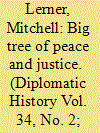

|
|
|
|
|
| Publication |
2010.
|
| Summary/Abstract |
During his three years as John F. Kennedy's vice president, Lyndon Johnson made eleven trips to thirty-three countries, covering over 120,000 miles, more than any of his predecessors. Yet, few contemporaries, including the journalist who described Johnson as someone "who chases around continents in search of the duties of his office," considered these trips significant.1 Some even suspected that he was sent away so often simply because JFK wanted to keep the overbearing Texan occupied and hence away from him; Kennedy, one West Virginia newspaper wrote, had recently sent him overseas twice in order "to keep his Vice President busy."2 Most policymakers also saw these missions as unimportant. Deputy Undersecretary of State William Crockett, who sometimes accompanied Johnson, recalled that "on the trips he took as Vice-President, there wasn't much policy to discuss; they were essentially representational functions."3 Such sentiments were both common and unsurprising, as Americans everywhere recognized that Johnson played virtually no role in the major policy decisions of the administration. In 1963, Time Magazine noted that the former Senate leader was now "lost in the vice-presidency," and a Newsweek article entitled "LBJ: Who's That?" described its subject as "as powerless as a freshman Senator and almost as obscure."4 A year earlier, Newsweek had noted of the former leader that "Lyndon Johnson is in the position of an abdicated king, and kings who abdicate are monarchs without power."5 His nonexistence seemed confirmed by the television show Candid Camera, which asked random people, "Who is Lyndon Johnson?" Answers flew: a baseball player, an astronaut, but no one (at least, no one who was televised) identified him as the vice president of theUnited States. "No, I don't know him," explained one man. "I'm from New Jersey.
|
|
|
|
|
|
|
|
|
|
|
|
|
|
|
|
| 2 |
ID:
164660
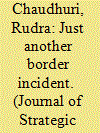

|
|
|
|
|
| Summary/Abstract |
The India–Pakistan War of September 1965 has attracted little attention in the larger body of work on South Asia. Further, almost nothing has been written on the earlier skirmish, in April 1965, between Indian and Pakistani security forces in the Rann-of-Kutch, an uninhabited salt marsh. This article argues that the limited conflict in the Rann, its immediate consequences, and its impact on Pakistani military and civilian leaders were central to Pakistan’s consideration of a military solution to the ongoing dispute in Kashmir, which then led to Indian retaliation and the outbreak of war.
|
|
|
|
|
|
|
|
|
|
|
|
|
|
|
|
| 3 |
ID:
112148
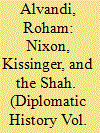

|
|
|
|
|
| Publication |
2012.
|
| Summary/Abstract |
The Nixon Doctrine marked a turning point in American strategies of containment in the Persian Gulf. Whereas Lyndon Johnson had sought to balance Iran and Saudi Arabia as the "twin pillars" of the region during the British withdrawal "east of Suez," between 1969 and 1972 Nixon gradually adopted a policy of Iranian primacy. Declining Anglo-American power does not provide an adequate explanation for this shift in U.S. Gulf policy. These constraints confronted both Johnson and Nixon, yet each president adopted quite distinct Gulf policies. Drawing on American, British, and Iranian sources, this article makes the case that the shift in U.S. Gulf policy from balancing under Johnson to Iranian primacy under Nixon reflected a change in American thinking about the shah of Iran, Muhammad Reza Pahlavi. This change in American thinking provided fertile ground for the shah's relentless efforts to secure Washington's backing for Iran's regional primacy throughout the 1970s.
|
|
|
|
|
|
|
|
|
|
|
|
|
|
|
|
| 4 |
ID:
153790
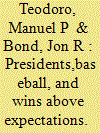

|
|
|
|
|
| Summary/Abstract |
Presidential scholars and baseball writers debate who were the greatest. While baseball analysis evolved from qualitative impressions of “experts” to rigorous, data-driven “sabermetrics,” analysis of presidential greatness continues to rely on “old-school” reputational rankings based on surveys of scholars’ qualitative assessments. Presidential-congressional relations and baseball are all about winning, but what fans (of sports and politics) find most intriguing is Wins Above Expectations (WAE)—did the team do better or worse than expected? This paper adapts the Pythagorean Expectations (PE) formula developed to analyze baseball to assess legislative success of presidents from Eisenhower to Obama. A parsimonious regression model and the PE formula predict annual success rates with 90% accuracy. The estimates of WAE from the two approaches, however, are uncorrelated. Regression analysis does not identify any president who systematically exceeded expectations, but sabermetric analysis indicates that Republican presidents outperform Democrats. Neither approach correlates with recent presidential greatness rankings.
|
|
|
|
|
|
|
|
|
|
|
|
|
|
|
|
| 5 |
ID:
074707
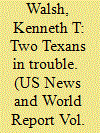

|
|
|
| 6 |
ID:
183157


|
|
|
|
|
| Summary/Abstract |
This analysis explores the efforts of the Lyndon Johnson Administration, for both moral and pragmatic reasons, to distance itself from apartheid South Africa during the 1960s. By 1964, the bilateral relationship with Pretoria was becoming a diplomatic liability for the White House. The international community, especially newly independent Afro-Asian states, was increasingly vocal in condemning South Africa, and domestically, the United States was seeking to remove the legacy of racial discrimination from its own society. Washington’s close economic and strategic ties to Pretoria, however, made taking a tough line with South Africa and broader disengagement from the apartheid state a difficult balancing act.
|
|
|
|
|
|
|
|
|
|
|
|
|
|
|
|
|
|
|
|
|